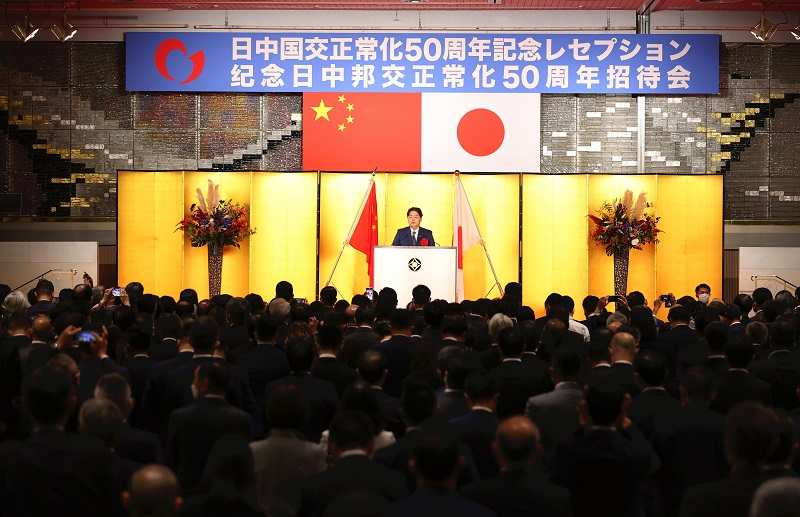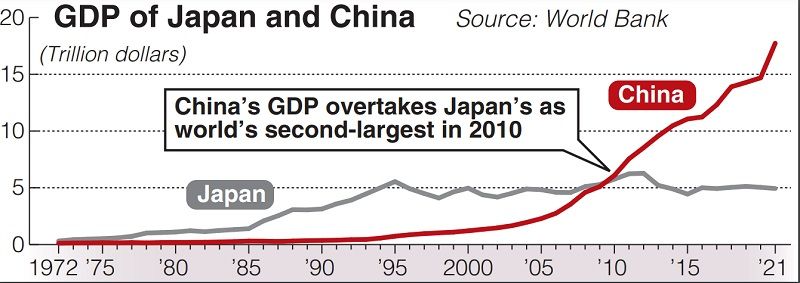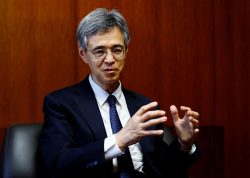
Foreign Minister Yoshimasa Hayashi gives a speech in Tokyo on Thursday at a commemorative event to celebrate the 50th anniversary of the normalization of diplomatic relations between Japan and China.
20:00 JST, September 30, 2022
Japan and China on Thursday marked the 50th anniversary of their normalization of bilateral diplomatic relations even as tensions between the two countries remain high.
As the two will always be neighbors, Tokyo and Beijing both recognize the need to improve relations, yet there are no concrete prospects for that. The key will be whether Prime Minister Fumio Kishida and Chinese President Xi Jinping can find the right timing for a political compromise.
More than 800 people attended an event to celebrate the milestone in Japan-China relations at a hotel in Tokyo on Thursday, applauding at the reading of congratulatory messages sent by the two leaders.
Kishida’s message said, “Both Japan and China share a great responsibility for regional and global peace and prosperity.”
Xi’s message said, “Over the past 50 years, we have continuously deepened exchanges and cooperation and promoted regional and global peace and development.”
However, Kishida, who had been invited to the event, was not present.
In an effort to build momentum for improving bilateral ties, Kishida had left his attendance at the event open until the last minute, waiting to see how Beijing would respond. For him, the nonnegotiable condition was that either Xi or Chinese Premier Li Keqiang would attend a corresponding Beijing event hosted by the Chinese side.
From intrusions into Japan’s territorial waters around the Senkaku Islands in Ishigaki, Okinawa Prefecture, to its unilateral development of gas fields in the East China Sea, there is no sign that Beijing intends to ease its hegemonic moves.
A Japanese government official explained that under such circumstances, if Kishida alone were to attend an event, “Beijing would see that Tokyo is willing to move forward to improve relations and take unfair advantage of that.”
On Wednesday evening, Kishida decided to skip the Tokyo event as soon as he learned that neither of the two Chinese leaders would be present at the Beijing event.
“They won’t show up, so it can’t be helped,” Kishida was quoted as saying to those close to him.
In the end, Beijing’s event was attended by Ding Zhongli, vice chairman of the Standing Committee of the National People’s Congress, who is not a member of the Communist Party.
Open to dialogue
Holding a dialogue with Xi, who has vast authority, is essential to resolving pending issues. Kishida is aware of the need to build a relationship with Xi that allows the two to talk, and has repeatedly stated that he is “open to dialogue.”
Although Kishida seeks a reasonable compromise with China, the nature of Beijing’s authoritarian regime means that “it is difficult to see the foreign policy decision-making process and grasp Xi’s intentions,” according to a senior Foreign Ministry official.
On Aug. 17, Takeo Akiba, secretary general of the National Security Secretariat, visited China and met with China’s top diplomat Yang Jiechi, a member of the Politburo of the Chinese Communist Party. They confirmed the continuation of dialogue, but no significant progress has been made since, and no meeting between the Japanese and Chinese foreign ministers has taken place.
“There has been no mutual trust being fostered at all,” Japanese Ambassador to China Hideo Tarumi said in his address at the Beijing event, reflecting the lack of a festive mood. “This is the most severe situation since the normalization of diplomatic relations.”
Kishida also has heard from business circles, in which many people are hoping for a political thaw. On the other hand, within the Liberal Democratic Party, vigilance toward China has been growing over the situation in Taiwan and economic security. It is also necessary for Japan to strike a balance with the policy of the United States, which regards China as a competitor.
On Thursday evening, asked by reporters about a possible summit meeting, Kishida only gave what sounded like a canned answer, saying, “Nothing is set in stone, but we will continue to engage in dialogue at various levels.”
The summit meeting of the Group of 20 major economies scheduled for November will likely present a good opportunity for the two leaders to have talks.
Will Kishida be able to advance diplomacy with China by carefully using his prudence and boldness as needed? The prime minister’s diplomatic skills will be put to the test.

China eases criticism of Japan
BEIJING — At the 50th anniversary milestone, the administration of Chinese President Xi Jinping appears to have softened its aggressive stance toward Japan, which has strengthened ties with the United States against China over the Taiwan issue.
After a visit to Taiwan in August by U.S. House of Representatives Speaker Nancy Pelosi, China unilaterally canceled a foreign ministerial meeting with Japan. The mood in China had been critical of Japan’s stance on the Taiwan issue, rather than being celebrative of the 50th anniversary.
But in September, Beijing hosted a series of commemorative events to mark the milestone. As if reflecting the administration’s intentions, direct criticism of Japan, including over the Taiwan issue, was subdued in messages sent by former State Councilor Tang Jiaxuan — whose position is equivalent to deputy prime minister — and others for a Chinese-sponsored memorial event in Beijing.
Xi’s congratulatory message to Prime Minister Fumio Kishida on Thursday was the first sent by a Chinese president to mark an anniversary of diplomatic ties. In the past, it was Chinese premiers who exchanged congratulatory messages with Japanese prime ministers every five years. Most recently, former Prime Minister Shinzo Abe and Premier Li Keqiang exchanged congratulations in 2017.
Some in Japan’s Foreign Ministry believe that the Chinese side has “upgraded” their exchange to show consideration for the milestone.
Xi’s message referred back to the two countries’ 1972 joint statement, in which China reiterated that Taiwan is an inalienable part of its territory, and Japan said it understood and respected China’s position.
In the upcoming National Party Congress this month, Xi aims for an unprecedented third term as China’s leader. Ahead of this crucial political event, Xi appears intent on calming relations with neighboring Japan and keeping the Taiwan issue from becoming too much of a focus.
In part, the move is also aimed at persuading Japanese companies to stay in China amid uncertainty over the country’s economic outlook due to China’s zero-COVID policy. In addition, it is seen as an attempt to drive a wedge between Japan and the United States, which together are leading players in security cooperation in the Indo-Pacific region.
At the same time, however, National People’s Congress official Ding Zhongli, who attended a commemorative event in Beijing on Thursday, stressed, “The obstacles and challenges confronting China-Japan relations are getting tougher by the day, and [relations] are on the verge of being pushed back if they do not move forward.”
Ding’s remarks can be interpreted as a suggestion that China’s stance toward Japan can change depending on how Japan responds.
At 7 p.m. on Thursday, the top news story on China Central Television was China’s celebration of 50 years of diplomatic relations with Argentina. The 50th anniversary of the normalization of Japan-China diplomatic relations came second.
At 7 p.m. on Thursday, the top news story on China Central Television was China’s celebration of 50 years of diplomatic relations with Argentina. The 50th anniversary of the normalization of Japan-China diplomatic relations followed that.
Top Articles in Politics
-

Japan PM Takaichi’s Cabinet Resigns en Masse
-

Sanae Takaichi Elected Prime Minister of Japan; Keeps All Cabinet Appointees from Previous Term
-

Japan’s Govt to Submit Road Map for Growth Strategy in March, PM Takaichi to Announce in Upcoming Policy Speech
-

LDP Wins Historic Landslide Victory
-

LDP Wins Landslide Victory, Secures Single-party Majority; Ruling Coalition with JIP Poised to Secure Over 300 seats (UPDATE 1)
JN ACCESS RANKING
-

Producer Behind Pop Group XG Arrested for Cocaine Possession
-

Japan PM Takaichi’s Cabinet Resigns en Masse
-

Man Infected with Measles Reportedly Dined at Restaurant in Tokyo Station
-

Israeli Ambassador to Japan Speaks about Japan’s Role in the Reconstruction of Gaza
-

Videos Plagiarized, Reposted with False Subtitles Claiming ‘Ryukyu Belongs to China’; Anti-China False Information Also Posted in Japan
























